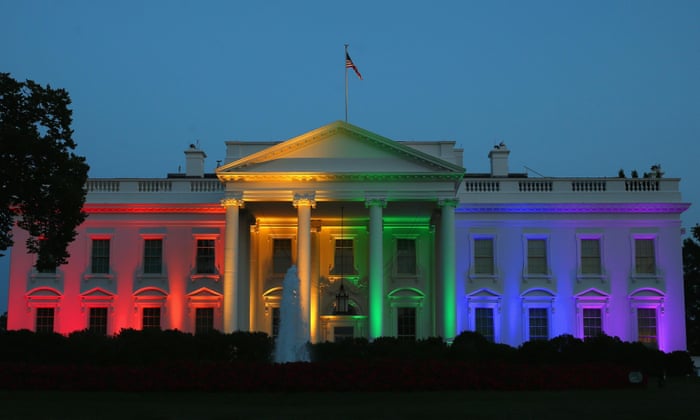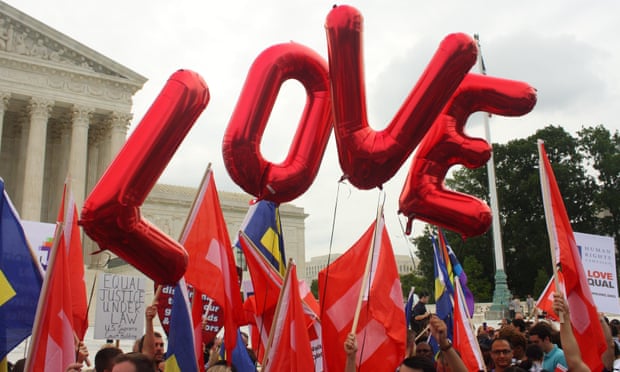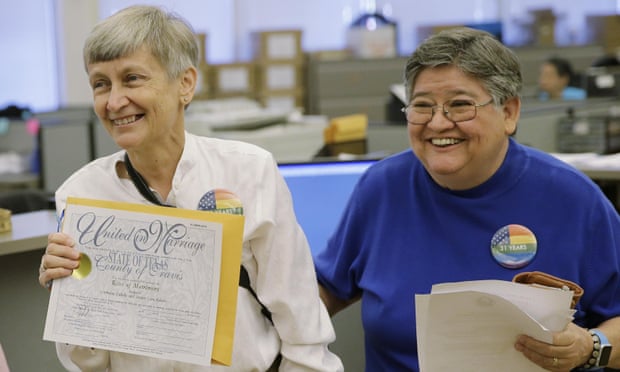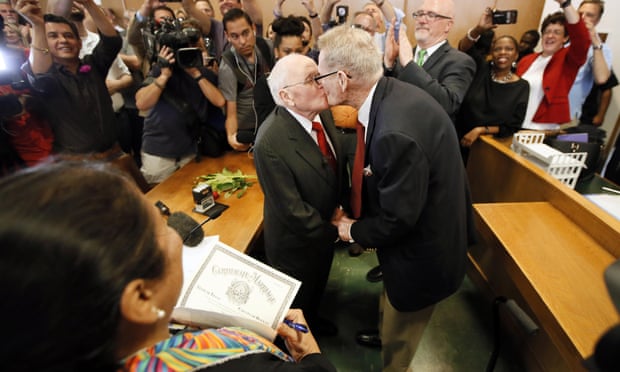With 5-4 ruling in Obergefell v Hodges, justices determine right to marriage equality is protected under constitution in decision hailed as ‘victory of love’

Same-sex marriages are now legal across the entirety of the United States after a historic supreme court ruling that declared attempts by conservative states to ban them unconstitutional.
In what may prove the most important civil rights case in a generation, five of the nine court justices determined that the right to marriage equality was enshrined under the equal protection clause of the 14th amendment.
Victory in the case – known as Obergefell v Hodges, after an Ohio man who sued the state to get his name listed on his late husband’s death certificate – capped years of campaigning by LGBT rights activists, high-powered attorneys and couples waiting decades for the justices to rule. It immediately led to scenes of jubilation from coast to coast, as campaigners, politicians and everyday people – gay, straight and in-between – hailed “a victory of love”.
The ruling, in which Justice Anthony Kennedy cast the deciding vote, means the number of states where gay marriage is legal will rise – albeit after some stalling – from 37 to 50.
‘The arc of history is quite clear’
Speaking from the White House after calling one of the plaintiffs, Barack Obama said the decision would “end the patchwork system we currently have”.
“This ruling is a victory for America,” the president said. “This decision affirms what millions of Americans already believe in their hearts: when all Americans are treated as equal, we are all more free.”
Four liberal justices and Kennedy rejected claims made by lawyers during the legal argument in April that marriage was defined by law solely to encourage procreation within stable family units – and therefore could only meaningfully apply to men and women.
“The Constitution promises liberty to all within its reach, a liberty that includes certain specific rights that allow persons, within a lawful realm, to define and express their identity,” wrote Kennedy.
“The petitioners in these cases seek to find that liberty by marrying someone of the same sex and having their marriages deemed lawful on the same terms and conditions as marriages between persons of the opposite sex,” he added.
Crucially, the majority ruling argues that the court has frequently exercised jurisdiction over the definition of marriage in previous cases and is not overstepping its constitutional role by intervening now.
“This Court’s cases have expressed constitutional principles of broader reach. In defining the right to marry these cases have identified essential attributes of that right based in history, tradition and other constitutional liberties inherent in this intimate bond,” wrote Kennedy.
Scenes of happiness

The crowd outside the court – indeed, across the country – erupted in joy after the ruling was handed down, with many longtime campaigners crying tears of joy and embracing their partners.
Chants of “Love has won” reverberated among the hundreds gathered below the court steps and across the street outside the US Capitol, as rainbow flags intertwined with the American flag.
Among the crowd was California representative Mark Takano, an openly gay member of Congress who described being at the scene as both “profound and pointed”.
“I feel like the supreme court has just thrown a huge wedding bouquet to LGBT people all across the country and couples are going to be rushing to catch that bouquet,” Takano told the Guardian.
Takano nonetheless cautioned that there remained legal obstacles ahead, insisting that a comprehensive civil rights act would be required to ensure that LGBT individuals do not face housing and employment discrimination, among other barriers. But he was optimistic that the ruling had set the tone.
“The arc of history is quite clear that the struggle for LGBT equality is part of our civil rights,” Takano said.
Judd Proctor, a 65-year-old resident of Silver Spring, Maryland, said he never thought he would live to see the day that gay marriage would be a constitutional right.
“When I first met my partner 20 years ago, I never thought there would be marriage. We had a commitment ceremony,” he told the Guardian outside the court.
Joy across America

Randy Johnson, a plaintiff in one of the concurrent cases brought from Kentucky before the court with his partner Paul Campion, said he still had goosebumps, hours after their 20-year-old son had texted them two words: “We won.”
“As soon as we heard the news, we were obviously in tears, and obviously overcome with emotion because this is the most amazing event we could imagine,” Johnson told the Guardian.
Georgia was one of several states that began to issue marriage licenses immediately following the decision. Kathie DeNobriga, the mayor of Atlanta suburb Pine Lake who married her long-term partner out of state last year as one of the few openly gay politicians in the American south, called the court ruling “a victory of love in opposition to fear”.
“It was like I was sneaking away to get married,” she said. “Now we all have not the privilege, but a right to get married where we are.”
Legal same-sex weddings were taking place for the first time on Friday across Alabama, Arkansas, Kentucky, Michigan, Missouri, North Dakota, South Dakota and Tennessee, even as the attorneys general in Texas and Mississippi said marriages could not take place immediately.
Texas attorney general Ken Paxton issued a long statement suggesting he would attempt to fight the legalisation of gay marriage by asserting the “religious liberties” of clerks and officials.
Louisiana attorney general Buddy Caldwell also released a statement saying that the decision “overturns the will of the people of Louisiana” and that “nothing in today’s decision makes the court’s order effective immediately”.
But Mississippi attorney general Jim Hood later backtracked after initially ordering clerks not to issue licenses “immediately”. He subsequently clarified that his office “is certainly not standing in the way of the supreme court’s decision”.
Two gay couples waited at the state vital records office in New Orleans to get their marriage licenses. And waited, and waited.
Earl Benjamin, 39, and Michael Robinson, 41, arrived moments after the supreme court’s announcement. But they hit a wall of bureaucracy, saying officials told them there would be a delay as they had to reboot the computer system and were “waiting for clearance”.
The pair felt that officials were deliberately dragging their heels. “It’s mixed emotions for sure. For us right now it’s become painfully clear that there’s some resistance to us getting a license,” Robinson said, the two clutching flowers and boxes of cupcakes brought by friends who had arrived to congratulate them.
Benjamin said it was frustrating to see heterosexual couples arrive and leave with their licenses without any problem, though “each of those couples has come over to us and said congratulations.”
The couple, who have been together 14 years, were willing to wait all day. But in the early afternoon, after they had been sitting in the office for four-and-a-half hours, they were told by an official that the state would not be issuing marriage licenses today as it waits for a ruling by the federal fifth circuit appeals court, which also took up the issue. That will be a formality given the supreme court’s decision.
“We’re still excited but we’re also a bit saddened that we weren’t able to get our license today,” Benjamin said after leaving the office. “You become accustomed to discrimination, you come to expect it … We’re going to be looking forward to marrying each other soon.”
Every summer Friday, the Wayne County clerk’s office in Detroit holds mass wedding ceremonies to accommodate the seasonal increase in marriages. On Friday, that included same-sex marriages, though the county clerk’s office didn’t have a specific number just before it closed for the day.
“There’s really been nothing different, we’ve just been handling things like we do every business day,” said Jina Sawani, a spokesperson for the office.
Starting on Monday, mass weddings will be held at the office every weekday at 3pm.
‘The right to marry is fundamental’

In a nod to an argument colorfully expressed by Justice Ruth Bader Ginsburg during the hearing, the ruling also rejects the notion that the state definition of marriage rests on the ability of couples to procreate.
“That is not to say the right to marry is less meaningful for those who do not or cannot have children,” writes Kennedy, after pointing out the advantages for children of same-sex couples. “An ability, desire, or promise to procreate is not and has not been a prerequisite for a valid marriage in any State.”
And in perhaps the most sweeping section of the lengthy ruling, Kennedy rejected the concern expressed by chief justice John Roberts that the court should not get too far ahead of traditional conceptions of marriage that are limited to a man and a woman.
“The right to marry is fundamental as a matter of history and tradition, but rights come not from ancient sources,” writes Kennedy. “They rise, too, from a better informed understanding of how constitutional imperatives define a liberty that remains urgent in our own era.”
In one of four separate dissents, Roberts attacked the decision, arguing: “This Court is not a legislature. Whether same-sex marriage is a good idea should be of no concern to us. Under the Constitution, judges have power to say what the law is, not what it should be.”
But the five justices in the majority argued that depriving them of marriage equality “serve[d] to disrespect and subordinate” gay and lesbian people.
“It is now clear that the challenged laws burden the liberty of same-sex couples, and it must be further acknowledged that they abridge central precepts of equality,” they argued. “Especially against a long history of disapproval of their relationships, this denial to same-sex couples of the right to marry works a grave and continuing harm.”
Lawyers advising couples looking to take advantage of the historic ruling warned that it could take some time for states to react.
“Uniform implementation of the ruling state by state will undoubtedly take time,” said Robert Stanley, a partner in Beverly Hills family law firm Jaffe and Clemens. “Certainly, some states are expected to rebel and stall implementation as long as possible.”
The nation’s highest tribunal last weighed marriage equality in 2012, with challenges to California’s effective ban on same-sex marriages, known as Proposition 8, and a key provision of the federal Defense of Marriage Act (Doma).
The justices then ruled in favor of marriage equality proponents, but ducked the question of whether gay marriage was a constitutional right.
Roberta Kaplan, the lawyer who successfully argued the Doma case, said “there is nothing” in Friday’s ruling that she was concerned about that could lead to major legal challenges.
“This is the pinnacle of our success so far,” she told the Guardian. “It is hard for me to see now that any court, anywhere, state or federal, could possibly tolerate discrimination against gay people on any basis.”
The rulings nonetheless kicked off a wave of decisions among courts across the country that struck down state-level bans on same-sex marriage and accelerated a trend that has seen the number of states allowing such weddings soar from just two in 2008, to all 50 in 2015 – plus the District of Columbia, from where a national celebration was only beginning on Friday morning.
The US becomes the 21st country to recognise same-sex marriage across the country.
“Love is love,” Obama said.
- Additional reporting by Alan Yuhas and Nicky Woolf in New York, Steven W Thrasher in Buffalo, New York, George Chidi in Atlanta, Rory Carroll in San Francisco, Amanda Holpuch in Ann Arbor, Michigan, and Tom Dart in New Orleans
No comments:
Post a Comment